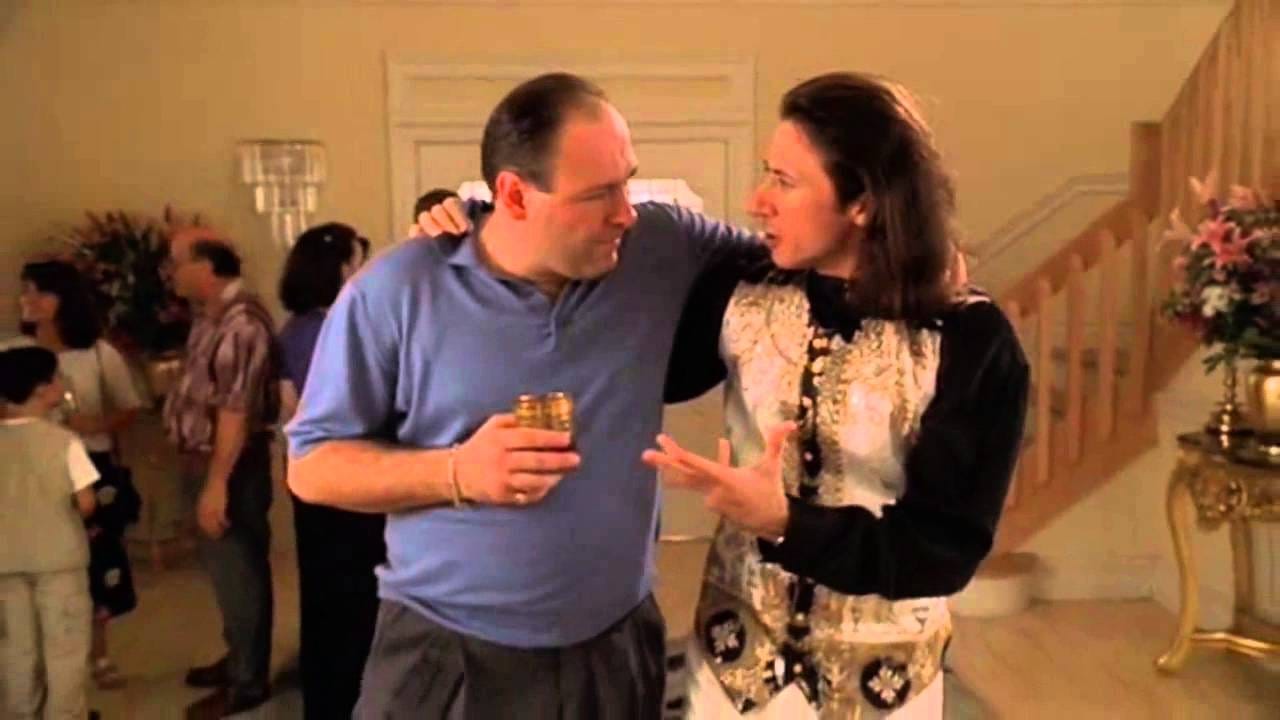18. Giving the Beating or Taking It?
“Furio? Coming here? Why, to see what indoor plumbing looks like?”

I just complained last week about this recent weak run of episodes making me reconsider my strong pro-season two stance, but I’ve fully regressed back to my previous take after rewatching “Big Girls Don’t Cry,” which might be my favorite episode outside the generally agreed upon god-tier of best Sopranos episodes. In general, I love a Terence Winter-written episode, and this one in particular is packed with all the things I love most about the series.
First of all, Winter is the best at creating scenes for three of my favorite characters — Adriana, Christopher, and Dr. Melfi — that are in-the-moment enjoyable but also complicate their long narrative trajectories. Here, Christopher’s foray into acting digs into the interplay between his desire for a different life and his lack of self-reflection, and it showcases the tragedy of Adriana being born into a world that has no space for her fundamental kindness. It’s sad on a first watch and it’s absolutely brutal once you know where things are headed. And yet I still cackle like a demon at moments like “Acting is mostly feelings. Unless the actor is driving a car or sword fighting or something.” and “He’s a douchebag.”
Similarly, I think it’s well-established at this point that, if I were to create a vision board, it would just be a Top 10 Anime Betrayals-style compilation of Jennifer Melfi’s bitchiest lines — and “you smug cocksucker, fuck you” hits even harder in our post-Bogdanovich Vulture profile world. But, jokes aside, those therapy sessions are a devastating peek at who she is and how she thinks (as well as a violent personal attack on my trying-not-to-cry voice.) You’d be a repressed maniac too if you expressed some vulnerability for once and that was the response you received.
Winter also has a gift for throwing characters I tend to be ambivalent about into weird situations that make me appreciate them more — in this case, Hesh playing the part of Tony’s second-string therapist. Their psuedo-sessions are mostly silly; the first one is really just a setup for a joke about how old men can turn any conversation to the topic of their recent medical procedures. But during the second, they stumble into the subject of Tony’s dad’s panic attacks, which I don’t think any other character would be both informed about and willing to divulge.
And yet this big reveal also doesn’t end up carrying as much weight as you might want it to, which is another of the things I love most about the show, its subversion of narrative expectations. Tony might have identified a point of origin for his mental health woes, but it doesn’t matter if he refuses to use that knowledge as a starting point to change his behavior going forward. He wants to point to it as evidence of genetic predisposition, but that argument requires ignoring the fact that he and his father led similar lives and had the exact same job, and the episode points to the idea that it’s both biological and contextual — and leaves the question of whether Tony will ever figure that out for himself open-ended.
Much of the episode’s ability to execute an ambiguous and open-ended narrative without crossing the line into sloppiness comes from the fact that Winter loves weird details. Some of these details are just goofy: Irina’s water wings, Tony eating gabagool dipped in mayo right after extolling the virtues of well-made buffalo mozzarella, Silvio correcting Paulie on the ethnicity of the mark of the week’s girlfriend. But others are deeply revealing. In one mundane conversation, Pussy confirms that he’s not informing because he loves his family; he’s informing because he’s a petty, insecure little bitch.
And in another, equally basic-on-the-surface moment, the Carmela-Tony-Furio triangle is born: Carm is charmed by Furio’s efforts to endear himself to children; Tony recognizes a kindred spirit in them, sees right through them to his propensity for violence. And the beatdown Furio delivers near the end of the episode is maybe the most violent scene of the series to this point. It’s brutal, but it’s not gratuitous because it serves two purposes: 1) it reinforces Christopher’s inadequacy, and 2) it sets up the idea that it’s fucked up that the person Carmela idealizes as a way out of her life is, in fact, just like her husband but with better compartmentalizations skills.
But I think what I love most about Winter’s writing — the big overarching thing that ties all these other things together — is that it always tries (and is willing to fail) to answer the question I ask most frequently: Why is this person like this? He writes scenes that force us to marinate in the discomfort of how weird it is when other people can answer that question better than we can about ourselves — like Adriana can for Christopher, and like Melfi can for Tony.
As much as I hate to admit that things like “patience” and “self-control” can be good, the Tony-Melfi reunion was so much more satisfying after five weeks of waiting. Their first session back has always been one of my favorite scenes in the series; it’s full of writing and acting that’s so perfect it makes me feel like an abysmal failure at everything I’ve ever done in my life. I especially love the knowing smile she gives when she sees him in her waiting room despite his earlier effort to play hard to get, and the way he mirrors it a few moments later when she calls out his bullshit again for the first time, and then repeats it a few moments after that, when she does the same, but more harshly. It’s mortifying for him to be known so deeply — but it’s also a comfort.

